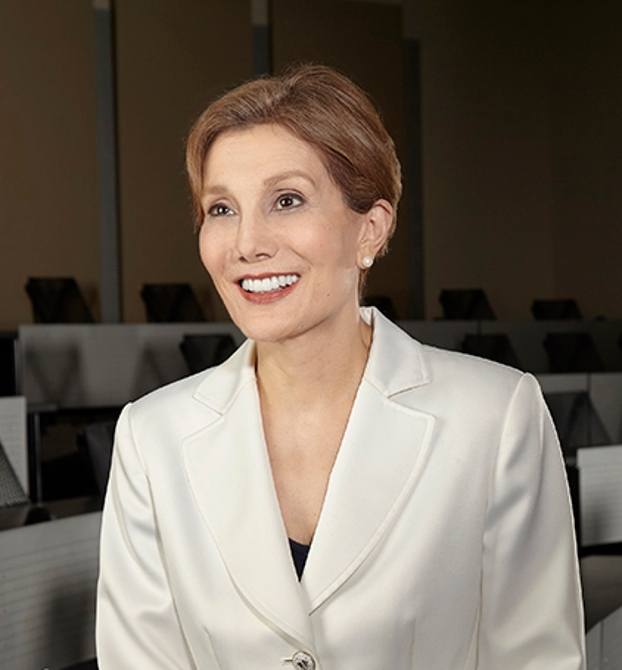Women’s History Month – It’s a time to recognize the trailblazers, pioneers, and leaders who have changed our world for the better. In honor of this special month, Georgia Tech Scheller College of Business student Nammu Kumar interviewed Dean Maryam Alavi to learn about her unique background and inspiring journey in business and leadership.
Alavi has served as dean of the College since 2014. As an expert in digital innovations and strategic IT applications, she has authored numerous published papers and served on the editorial boards of several prestigious business and technology journals. She is a recognized educator and advisor with extensive experience in leadership development and organizational capability building for a digital age.
 Kumar is a second-year Full-time MBA student who serves as president of the Women in Business Club. Her MBA focus areas include operations, strategy, and organizational behavior, and she will be joining Bank of America as an internal strategy consultant after graduation.
Kumar is a second-year Full-time MBA student who serves as president of the Women in Business Club. Her MBA focus areas include operations, strategy, and organizational behavior, and she will be joining Bank of America as an internal strategy consultant after graduation.
Q: Can you tell us about your childhood and upbringing?
I grew up in Tehran, the capital city of Iran, with a small, close-knit family and many ties to extended family, including grandparents, aunts, and cousins. I grew up in a supportive but relatively disciplined environment.
After graduating from high school, I came to the U.S. to pursue my undergraduate studies at the State University of New York in Buffalo. It was a total shock - the climate and the winds from the lake were a different experience altogether!
Q. What did you study in college?And what did you do after graduation?
In high school, I was very good at math, and my initial plan was to study physics in college. I happened to have a conversation with a cousin who told me about computer science as a field of study. I ended up earning my bachelor’s and master’s degrees in computer science.
After earning my master’s degree, I started working in a company in a technical position as a computer scientist. That’s when I started to learn about business, management, and organizations. Frankly, I found it fascinating. One of the things I discovered was that technology in and of itself doesn’t produce a lot of value - how technology is applied within organizations and business models is where value is created. I then decided to pursue my Ph.D. in an interdisciplinary area between computer science and business at The Ohio State University.
Q. What were the key decisions that led you to where you are today?
There were three major decisions points that have brought me to where I am today. First was my decision to come to the U.S. for my higher education. That was a big decision. Second, my choice of computer science and information technology as a field of study. And finally, my decision to stay in academia as a career path.
Q. Who did you go to for advice and support along the way? Who are your role models?
I didn’t go to someone specific. It was more of an accumulation of observations and conversations. If I were to identify a role model, it would be my mother. She was a compassionate and generous but firm woman. She was the one who formed me into who I am.
Professionally, I have had multiple role models in different stages of my career. As a student, a young faculty member was my role model. Once I became a faculty member myself, my senior colleagues become my role models. My Ph.D. advisor, who retired very recently, always remained a support and mentor to me, even years after I finished my degree and found success as a faculty member. I could’ve not spoken with him for years, and when I would call him, it was like the time hadn’t even passed. I’m serving in a similar way for my past Ph.D. students.
Q. How do you feel like your culture and background have played into your journey?
I think coming from one culture and getting educated and working in another has given me a lot of flexibility, resilience, and sensitivity. You become very observant and open.
Q. Have you had any experiences as a woman in a technical field that may been difficult or challenging but also highlighted your strength?
My experience as a woman in a technical field was one in which I wasn’t as connected with a network, so to speak. In most of my courses, there were male students with their own groups and networks. I felt like an outlier. But the benefit is that you learn to be independent. It enhances your confidence, but you have to work a lot harder.
Q. What does leadership mean to you and has that understanding changed over time?
If you do a Google search on the word leadership, you get millions of hits. There are so many definitions. The field of leadership has been studied from so many lenses and dimensions – business, anthropology, sociology, history, and more.
There’s one definition that truly resonates with me. It’s by John Quincy Adams, the sixth president of the U.S. “If your actions inspire others to dream more, learn more, do more, and become more, you are a leader.” To me, leadership is about being humble and serving one’s followership.
Q. Looking back, would you have done anything differently in your career path or this journey?
I would have taken more risks earlier in my career - not reckless risks, but more calculated risks. It would’ve opened up a whole host of opportunities and connections.
Q. What is one piece of advice you’d like to give to female students and alumni at Scheller?
This is the advice I would give to my daughter, and I have: Be confident. Confidence is really important. Be confident and believe in yourself and don’t chase perfection. Don’t let perfection get in the way of good. Nobody’s perfect and in many cases, we don’t even know what perfect is. Have your mindset be, “This is good enough, I can figure it out, I can make it happen.”
Q. Do you think that’s a reflection in your leadership style as dean?
Yes, the longer one remains in a leadership position, the more humble one needs to be. You can never have all the information and all the answers, and you will always need others. It takes a village, particularly when things are uncertain, complex, or volatile.
Q. What do you think is next for you?
I want to do as good of a job as I can right now. Scheller is an amazing school. Georgia Tech is an amazing institution. I have never met so many smart and humble people in my life. This is a great environment.
